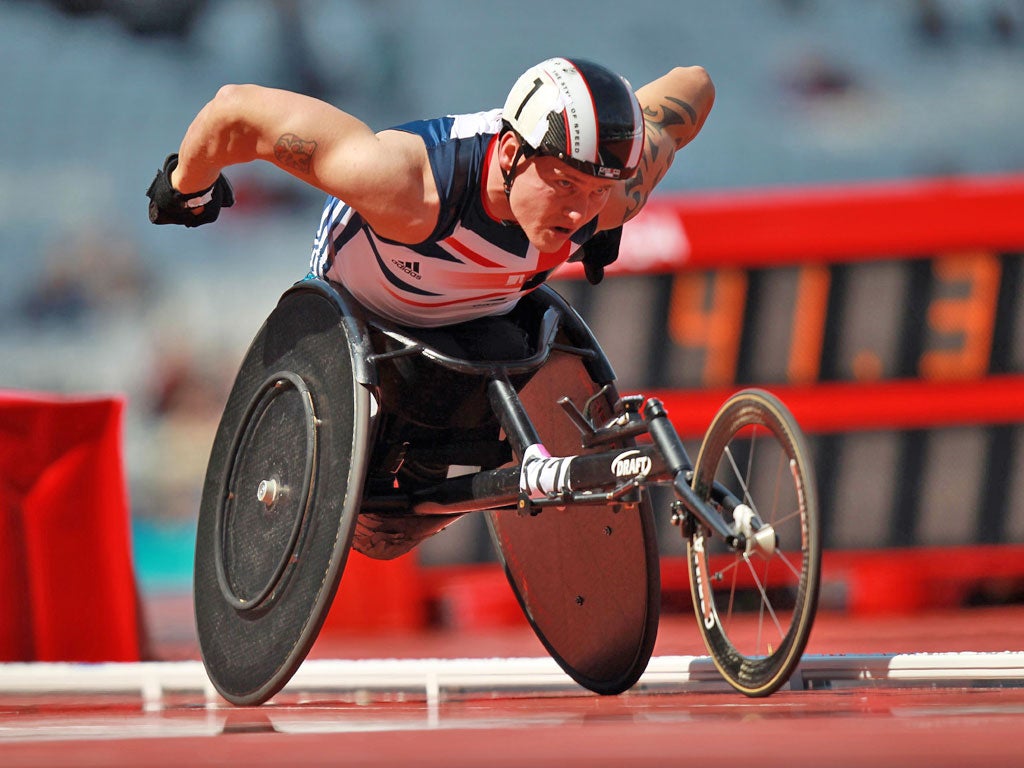Your support helps us to tell the story
From reproductive rights to climate change to Big Tech, The Independent is on the ground when the story is developing. Whether it's investigating the financials of Elon Musk's pro-Trump PAC or producing our latest documentary, 'The A Word', which shines a light on the American women fighting for reproductive rights, we know how important it is to parse out the facts from the messaging.
At such a critical moment in US history, we need reporters on the ground. Your donation allows us to keep sending journalists to speak to both sides of the story.
The Independent is trusted by Americans across the entire political spectrum. And unlike many other quality news outlets, we choose not to lock Americans out of our reporting and analysis with paywalls. We believe quality journalism should be available to everyone, paid for by those who can afford it.
Your support makes all the difference.Britain's Paralympians will be aiming to win a minimum of 103 medals from 12 different sports at the London Games, which begin in just under two weeks time.
The target is the same as that set for the Olympic team, in that it will require the Paralympians to win more medals in more different sports than in Beijing four years ago.
The team hope to finish second in the league table, as they did in Beijing, but far below the overall winners, China. In Beijing Great Britain won 102 medals, including 42 golds from 11 sports. China won 89 golds.
Baroness Sue Campbell, the head of UK Sport, which sets the targets, said the Paralympians could "aspire to close the gap", but that realistically they could not catch China, who more than doubled Great Britain's medal tally four years ago.
Only six medals separated Great Britain from the USA in third, and there were only nine gold medals between them and tenth place.
"There are a lot of unknowns in Paralympic sport," she said. "People move disciplines, or they enter very suddenly, and there is not a lot of international competition to benchmark against."
She said 16 sports have a medal target "within their range", and that if the upper ranges of the targets were reached, Great Britain could win 145 medals. 85 per cent of the medals are expected to come from athletics, swimming, equestrian events and cycling.
Owing to the number of different classifications, there are 505 medal events in the Paralympics, compared to 302 in the Olympics. "Winning medals in front of an excited home crowd will give us a great platform to help shift perceptions of Paralympic sport," said Tim Hollingsworth, British Paralympic Association chief.
He said the Paralympics would be about "momentum, not legacy. Legacy suggests you've got to where you want to be and are trying to sustain it. We want to build on the success of the Paralympics."
The Paralympic team has been backed by more than £49m of funding from UK Sport. The Olympic team had been set a minimum target of 48 medals for London 2012, but surpassed that figure, finishing with 65 medals which included 29 golds .
"British Paralympic sport is better-resourced and in a stronger position than ever before," said Baroness Campbell. "We are able to confirm that our goal of holding second place in the Paralympic medal table at our home Games remains on track, in line with our intentions set out back in 2006 when extra funding for Olympic and Paralympic sport was secured.
"The fantastic news we received last week from the Prime Minister that funding for elite sport is to be maintained into the Rio cycle is a wonderful endorsement for the achievements of our Olympic and Paralympic athletes to date.
"I'd like to wish our Paralympians, their coaches and support staff every success in London and I hope they gain the recognition they deserve for their commitment and dedication to British sport."

Join our commenting forum
Join thought-provoking conversations, follow other Independent readers and see their replies
Comments